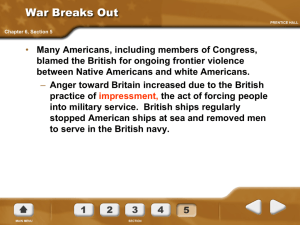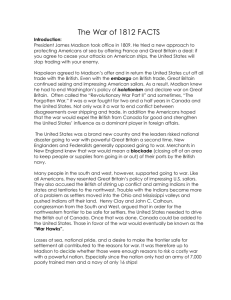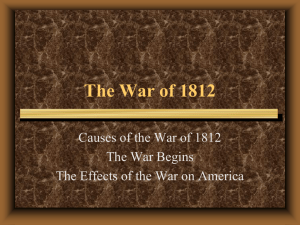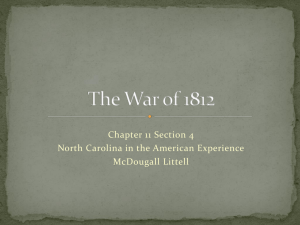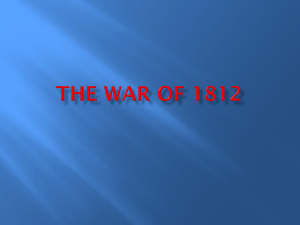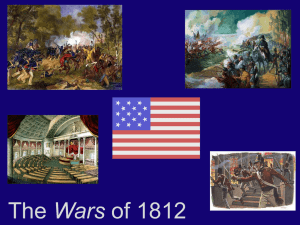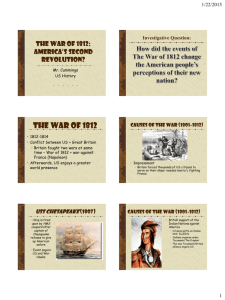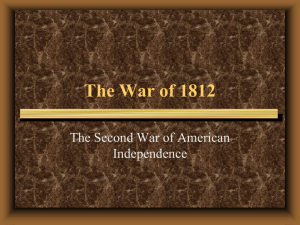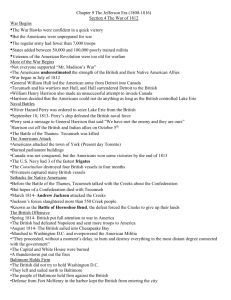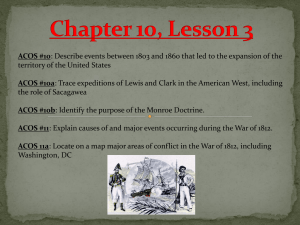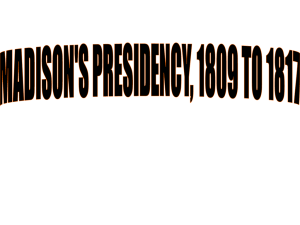War of 1812
advertisement
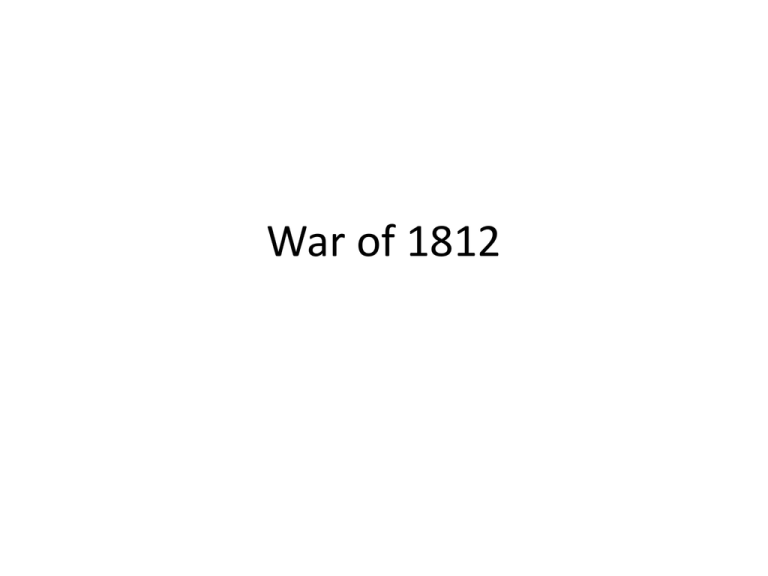
War of 1812 Causes for the War of 1812 • The British Navy is taking American sailors from American ships to sail on British ships. This is called impressment. Causes of War 1812 • Britain and France remain at war; Britain seizes American merchant ships bound for France • U.S. passes Embargo act of 1807 after British attack on the USS Chesapeake (killing 21 and wounding 18) which prohibited trade with other nations. • American exports fell drastically that lead to protests and repeal of Embargo Act1809 • Britain forces U.S. sailors to serve in British navy a practice known as impressment Native American Causes for the War of 1812 • The British army is supporting Native American resistance to American expansion on their land. • British were interfering and providing weapons to the Indians in uprisings; ie Ohio State in 1803 Causes for the War of 1812 • The United States has a desire to expand into more territory like British Canada • The real cause for this land grab is because of a poor transportation system and effects from the Embargo Act • Americans believe that seizing more land will end the depression Tecumseh and Indian Nationalism • Tecumseh, a Shawnee chief attempts to unify Indian tribes that have been removed from the Ohio River Valley • His brother, the Prophet preached that Indians should reject White ways and embrace their heritage • The brothers have a large following but their hopes are destroyed at the battle of fallen Timbers Political Debate Supporters • War Hawks” in Congress who want to expand US territory into British Canada & Spanish held Florida urge war • Regions included southerners and westerners who were land hungry and had a problem controlling the Indians • •Supporters • –Henry Clay –Kentucky • –John Calhoun – S. Carolina • –Felix Grundy - Tennessee • • • • Opponents •Federalist party supporters and members •New Englanders who feared that a British blockade would shutdown trade and manufacturing creating unemployment and depression Opponents included: –Daniel Webster War Begins • • Gen. William Henry Harrison fought an initial battle at Tippecanoe and the Indians rose all over the frontier. • War Hawks believed that war against the British in Canada would stop this source of Indian incitement. • saw this as an opportunity for complete destruction and pacification of the Native Americans. American Shortcomings in The War of 1812 • The military is poorly trained and led • The U.S. navy is no match for the British navy • American forces attempt to seize Canada but are poorly led and militia forces • Americans are forced to fight a defensive war against an invading professional army The Battle of Thames • October 5, 1813, British and Indian forces are defeated by American forces in Canada • Tecumseh’s death ends Indian resistance in the Ohio River Valley The British Burn the Capital • August 1814, the British Army invades the United States and marches on Washington D.C. • After a brief fight the city surrenders and nearly all government buildings are razed by fire • Madison rallies the American public after this defeat “The Star Spangled Banner” • Francis Scott Key, a prisoner on a British barge witnessed the British bombardment of Fort McHenry, near Baltimore for 12 hours • In the morning he observed that the American flag still flew over the fort and writes a poem called “The Defence of Ft McHenry” it eventually becomes a song “The Star Spangled Banner” • Americans rally to the war effort after the capital is burnt down Treaty Of Ghent • Napoleon’s surrender in May 1814 • The poor British importance of European affairs took priority. • The Treaty of Ghent signed in December 1814, provided for no territorial changes or concessions. The Battle of New Orleans • American forces at New Orleans are led by General Andrew Jackson whose army inflicts great casualties on the British army • The battle was more decisive in promoting Jackson’spolitical career than in ending the war – the victory • came two weeks after the peace had been signed. Results of the War • 1) The war won British respect for the fighting ability of American Navy and the ability of American diplomats. • 2) American dislike of Britain was renewed and extended after the war, but the maritime issues ceased to be a problem with the peace. • 3) Defeat of the Native American tribes opened the whole area east of the Mississippi to settlement. – Native American tribes in midwest lost their ally, Britain; quickens westward expansion • 4) peace in Europe left America free to concentrate on its territorial expansion and other matters. • 5) The war increased the American spirit of nationalism and overcame disruptive forces of sectionalism • 6) Trade interruptions before and during the war forced a significant growth of American manufacturing.
